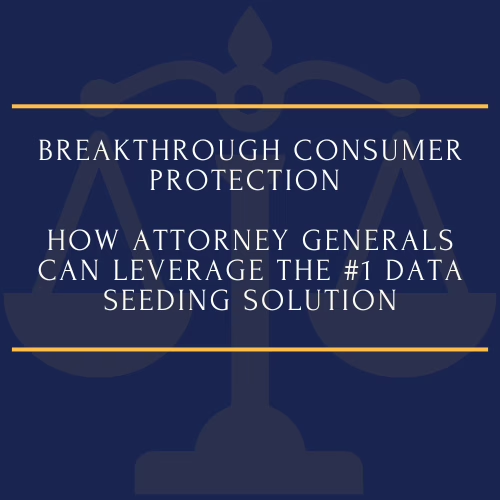Without a universal consumer privacy regulation akin to the General Data Protection Regulation (GDPR), individual states have taken the lead in protecting consumer data through laws like the California Consumer Privacy Act (CCPA) and other state-specific regulations. The Office of the Attorney General enforces these laws, investigating complaints and keeping an eye out that businesses comply with consumer protection standards.
Table of Contents
Attorney generals and their staff can feel overwhelmed with consumer complaints, which require thorough investigation, verification and evidence collection before action can be taken. This is where Assumed’s data seeding solutions can assist consumer protection agencies’ operations, providing a powerful tool to verify complaints, gather evidence and monitor businesses for abuse and compliance violations.

The Vital Role of Attorneys General in Consumer Protection
Attorneys general serve as the frontline defenders of consumer rights, making sure businesses adhere to privacy laws, fair advertising practices and ethical data handling. Their responsibilities include:
- Investigating consumer complaints related to deceptive practices, fraud and privacy violations.
- Enforcing state privacy laws such as CCPA, Virginia’s CDPA and Colorado’s CPA.
- Collaborating with federal agencies like the Federal Trade Commission (FTC) to combat nationwide consumer data abuses.
- Holding businesses accountable for improper data collection, unauthorized sharing and misleading marketing tactics.
Despite their role, attorney generals may struggle with limited resources and high volumes of complaints, making it difficult to verify claims efficiently. Data seeding can provide a solution.
How Attorney Generals Can Use Assumed’s Data Seeding Solutions to Strengthen Consumer Protection
1. Verifying Consumer Complaints with Actionable Evidence
Many consumer complaints involve unwanted solicitations, deceptive marketing or unauthorized data sharing. However, proving these violations can be challenging without direct evidence.
Assumed’s data seeding technology allows attorneys general to embed artificial consumer identities (known as Assumed Seeds) into databases, marketing lists and online forms. These seeded identities act as monitors, tracking how businesses handle consumer data. Regulators receive real-time alerts if a company misuses or sells these seeded identities, providing undeniable proof of non-compliance.
2. Monitoring Business-to-Consumer Communications for Abuse
Businesses often claim to follow privacy laws, but how can regulators verify compliance? Assumed Seeds can be strategically placed within marketing databases, lead generation platforms and customer outreach systems to detect:
- Unsolicited marketing emails or calls that violate TCPA or CAN-SPAM regulations
- Unauthorized data sharing with third-party advertisers or brokers
- Excessive or misleading communications that may constitute deceptive practices
By tracking interactions with these seeded identities, attorneys general can identify patterns of abuse and take swift enforcement action.
3. Ensuring Compliance Without Exposing Real Consumer Data
One of the biggest challenges in consumer protection investigations is verifying business practices without exposing real consumer data. Assumed’s data seeding approach eliminates this risk by using artificial consumer identities that mimic real users.
This allows regulators to:
- Test compliance without jeopardizing actual consumer privacy.
- Monitor businesses discreetly without alerting violators.
- Gather legally admissible evidence for enforcement actions.

How Attorneys General Can Implement Assumed Seeds
Step 1: Deploy Seeded Identities in Consumer Databases
Regulators can purchase and deploy Assumed Seeds into marketing lists, lead generation platforms and online forms to track how businesses handle consumer data.
Step 2: Monitor Communications and Data Sharing
Once seeded, these artificial identities will receive emails, calls and messages, allowing regulators to detect unauthorized data usage and non-compliant marketing practices.
Step 3: Gather Evidence for Enforcement Actions
If a business violates privacy laws, Assumed Seeds provides real-time alerts and detailed reports, allowing attorneys general to take swift action against offenders.
Step 4: Strengthen Consumer Protection Policies
By leveraging data seeding, regulators can proactively monitor businesses, reduce fraudulent practices, and enhance enforcement strategies across their state.
A Smarter Approach to Consumer Protection for Attorney Generals
Attorney generals and their staff face immense challenges in protecting consumer privacy, but data seeding technology offers a powerful solution. Using Assumed Seeds, regulators can verify complaints, monitor businesses and enforce compliance without exposing real consumer data.
As states continue to strengthen privacy laws, leveraging innovative tools like Assumed’s data seeding solutions will show if businesses adhere to ethical data practices.





